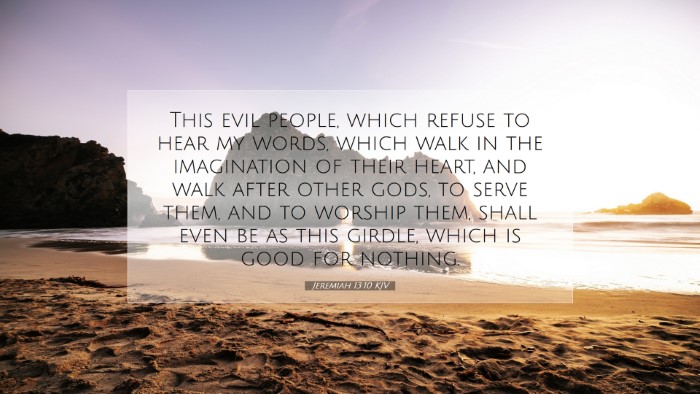Commentary on Jeremiah 13:10
Verse Reference: Jeremiah 13:10 - "This evil people, which refuse to hear my words, which walk in the imagination of their heart, and walk after other gods, to serve them, and to worship them, shall even be as this girdle, which is good for nothing."
Introduction
The book of Jeremiah is a profound reflection of God's covenant relationship with Israel and the impending judgment due to their disobedience.
In Jeremiah 13:10, the prophet makes a poignant declaration regarding the people of Judah, emphasizing their unfaithfulness and the consequences of their rebellion against God.
Contextual Analysis
In examining this verse, we note that Jeremiah often employed symbols to illustrate spiritual truths. The girdle (or waistband) mentioned is used to symbolize the close, intimate relationship that God desired with His people.
Just as a girdle is meant to be closely fitting, so too was Israel intended to be closely associated with God. However, the people’s refusal to heed God’s word exemplifies their spiritual dislocation and estrangement from Him.
Exegesis of Key Phrases
This evil people
The term "this evil people" signifies not just a group, but a characterization of their spiritual condition. Matthew Henry notes that it reflects their collective actions—
a summation of persistent rebellion against Yahweh's commands.
Refuse to hear my words
The refusal to hear God's words indicates a deliberate turning away from divine revelation. Albert Barnes explains that this signifies a hardened heart and a willful ignorance of God's statutes.
Such a stance brings forth inevitable decay and desolation, evident in their societal and spiritual decline.
Walk in the imagination of their heart
The phrase "walk in the imagination of their heart" points to the inner workings of the human mind—suggesting a departure from truth and an embrace of self-deception as Adam Clarke elaborates.
This path is perilous, leading to a distortion of divine will and ethical conduct, as they follow their own whims rather than divine prescription.
Walk after other gods
The pursuit of "other gods" signifies idolatry—a central grievance in Israel's infidelity. Henry emphasizes that this not only concerns physical idols but the broader concept of misplaced loyalties and affections—turning to worldly powers and philosophies that oppose God.
Good for nothing
The conclusion—"shall even be as this girdle, which is good for nothing"—serves as a somber warning. The girdle, designed for purpose, becomes useless due to its separation from the body.
This reflects the fate of a people who have distanced themselves from God’s life-giving presence. Barnes asserts that those who forsake God lose their identity, purpose, and ultimately face devastation.
Theological Implications
The implications of Jeremiah 13:10 are vast for contemporary believers and leaders. It challenges pastors and theologians to consider the condition of the church and society at large—
evaluating whether they too walk in the imaginations of their hearts rather than in faithful adherence to God’s Word.
The call to repentance remains ever relevant, as does the reminder of the consequences of idolatry in its various forms today.
Lessons for Today
- Heed God's Word: A vital reminder for believers is the necessity of listening and responding to God's revelations.
- Avoid Idolatry: The pursuit of what diverges from God—be it materialism, power, or secular philosophies—warns against placing anything above our relationship with Him.
- The Importance of Community: As a body of believers, we are called to nurture one another in obedience and faithfulness, thus avoiding the pitfalls of individualism and self-deception.
- Seeking Restoration: Understanding the grace available for restoration to a right relationship with God furthers our appreciation of His patience and love.
- Identity in Christ: Just as the girdle represented identity, our identity is found in Christ, and separation from Him renders us ineffective and purposeless.
Conclusion
In summary, Jeremiah 13:10 serves as a sobering declaration of the spiritual state of God's people and a stark warning about the implications of rebellion against Him.
For pastors, theological students, and scholars, this passage invites deep reflection on the nature of covenant fidelity, the dangers of spiritual complacency, and the call to a profound, active relationship with our Creator.


